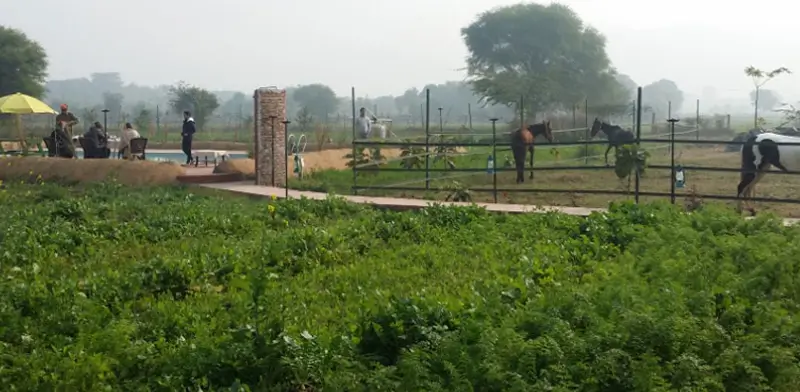
In a world where travel is becoming faster, flashier, and more commercial by the day, there’s a quiet shift happening — a growing desire among travelers to slow down, reconnect with nature, and support local communities. That’s exactly what Maa Ashapura Farm in Ranthambore has embraced. It’s not just a place to stay — it’s a model for sustainable tourism done right.
Let’s take a closer look at what makes this farm-resort more than just a charming escape — and how it’s setting a new standard for conscious hospitality in Rajasthan.
The foundation of Maa Ashapura Farm is simple: respect the land. Spread across acres of open space just a few kilometers from Ranthambore National Park, the resort is designed to blend into its surroundings — not compete with them.
Instead of concrete walls and flashy construction, you’ll find machan tents, natural wood structures, mud finishes, and open-air dining spaces. The idea is to let guests experience comfort without disconnecting from the land they’re on.
No trees are cut. No heavy digging. Everything here is built with nature in mind.
One of the farm’s proudest pillars is its organic kitchen garden. Unlike many commercial resorts that rely on bulk suppliers, Maa Ashapura Farm grows most of its vegetables, herbs, and even grains right on the property.
Guests are encouraged to walk through the fields, learn about local crops, and even lend a hand in watering or harvesting if they feel like it. And the food? It’s fresh, seasonal, and full of flavor. Think millet rotis, homemade butter, desi ghee, and chutneys made from ingredients grown a few meters away.
This direct “farm to plate” experience not only supports sustainable practices but also gives guests a rare connection to what they eat.
Sustainability isn’t just about growing food — it’s about how you handle waste too. At Maa Ashapura Farm, waste segregation is done at the source. Organic waste is composted and used back in the soil. Plastic use is minimal, and single-use items are avoided as much as possible.
Guests are encouraged to refill water bottles from safe, filtered dispensers instead of buying plastic bottles. Even toiletries are provided in reusable containers instead of wasteful sachets.
This farm is more than just a business — it’s a part of the local community. From the kitchen staff to the folk musicians, almost everyone working here is from nearby villages. The resort also sources materials like pottery, fabrics, and building supplies locally — supporting artisans and small businesses in the region.
The resort frequently hosts folk music evenings, traditional cooking demos, and storytelling sessions — not as a “performance” for tourists, but as a celebration of local culture and pride.
Maa Ashapura Farm also believes in educating its guests. Many arrive unaware of the environmental challenges that come with unchecked tourism. But during their stay, they often leave with a new appreciation for mindful travel — whether it's reducing water waste, supporting local products, or choosing experiences that don’t harm the environment.
The resort team gently encourages these habits, not with rules — but through example.
Maa Ashapura Farm isn’t trying to be trendy or “green” for the sake of marketing. It simply believes in living with the land — not off it. For travelers who care about their footprint, and want to leave a place better than they found it, this is one Ranthambore resort that truly walks the talk.